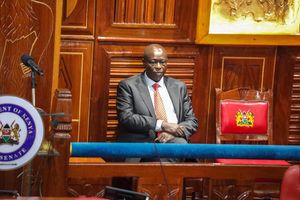Abductions, violence eroding trust in security

Plainclothes police officers arrest demonstrators in Nairobi on June 6, 2023, during protests against the Finance Bill 2023.
The promulgation of the Constitution of Kenya 2010 marked the beginning of a new era of accountability, democracy and the rule of law. However, more than a decade later, systemic governance failures continue to undermine the country’s commitment to upholding the rule of law, advancing constitutionalism and promoting social justice.
Violations of constitutional provisions, such as Article 33 on the freedom of expression and Article 37 on the freedom of assembly by security agencies, and the abductions have eroded public trust in the security system and the entire Kenya Kwanza government.
Kenya’s security agencies have a troubling history of constitutional violations, particularly in handling dissent. Recent months have seen an alarming trend of abductions and enforced disappearances targeting State critics.
During the recent anti-femicide protests, security agencies took a violent approach to managing peaceful demonstrators, including the use of tear gas and arbitrary arrests. This overshadowed the critical message of the protests, further undermining public trust in law enforcement’s role in ending gender-based violence.
Utterances by political leaders, including Interior Cabinet Secretary Kipchumba Murkomen and MP Oscar Sudi regarding the abductions highlight a troubling disregard for constitutional principles.
Their dismissive tone and failure to address the issue have not only undermined public confidence in the government’s commitment to upholding the Constitution, but also contributed to an environment of fear and uncertainty among citizens. Their statements risk normalising a culture of impunity.
Investigations into these incidents have yielded little to no tangible results, leaving victims and their families without justice or closure. Independent offices and commissions, envisioned as custodians of accountability under the 2010 Constitution, have often fallen short of their mandate.
To address these systemic issues, the President and the political class must refrain from interfering with the independence of constitutional bodies. Politicising their actions not only undermines their crucial role in promoting accountability and justice, but also perpetuates a dangerous cycle of impunity.
Timothy Kimaiyo, InformAction Kenya




